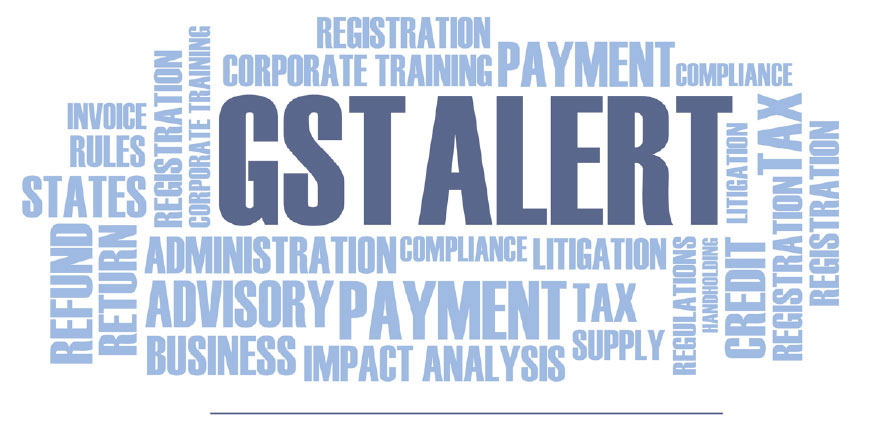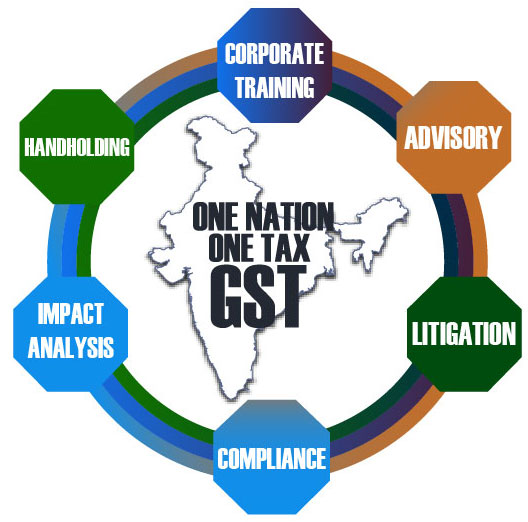Dated 14th June, 2021

In a landmark Judgement the Madras High Court hold that a contract price comprises of three components viz. cost factors, profit margin and tax component, thus the value of tax component on account of GST should be fully paid back to the contractor
Background:
Petitioner entered into an agreement with Tamil Nadu Water Supply and Drainage Board for laying under Ground Sewerage. The contract price was inclusive of TNVAT and Excise Duty components.
It was mentioned in the contract that deduction at source towards sales tax shall be made at 2% for civil works contract and at 5% for all other works contract. Under the GST Regime the distinction between civil works and other works became irrelevant since all the works contract for construction activities came to be taxed at 12%. Due to change in tax regime it became necessary to re-work the terms of the contract.
The Government of Tamil Nadu issued G.O.Ms. No. 296 Finance (Salaries) Department, dated 09.10.2017. The Government took note of the fact that the price bid to be quoted should be inclusive of taxes and duties. Accordingly, they came out with different formulas to determine taxes which got subsumed in the all inclusive contract. The Government came out with a formula as set out in paragraph No. 10 of the said Government Order.

"Paragraph 10"- Considering the necessity to provide for a transparent means of estimating subsumed tax Government direct that the following methodology be adopted for estimating the value of subsumed taxes in the contracted value of work:
- If the supplier has furnished break up of taxes within the quoted value (bid value) at the time of submission of tenders, it shall be taken as the basis for estimating the value of subsumed tax. If, after negotiation, the contracted value is less than the bid value, the tax quoted shall be proportionately reduced to arrive at estimate of the value of subsumed tax.
- In case, the breakup of taxes was not obtained or furnished in the bid document, the supplier may be asked to furnish breakup of the taxes within the contracted amount, giving details and explanations and based on this estimate of total subsumed tax shall be arrived.
- For instance, if for the contracted amount of Rs.48 lakh in the example above, the supplier states that the Central Excise Duty is Rs.1 lakh and VAT or CGST is Rs.1 lakh, after checking the reasonability of his claim, the subsumed tax may be arrived at Rs.2 lakh
- The estimate of subsumed tax should also be worked out independently from the departmental estimates. Revised Schedule of Rate (SOR) showing basic price and tax components separately are being issued by the Public Works Department. Using the revised SOR, revised departmental estimates for the work without subsumed tax shall be arrived as per normal procedure. The difference between the departmental estimates arrived using earlier SOR with taxes would constitute value of subsumed tax in the value of work.
For instance, if the bid value was Rs.50 lakh and the breakup of tax is Central Excise Duty of Rs.1 lakh and VAT or CGST of Rs.1 lakh, the corresponding subsumed tax as per his breakup of taxes is Rs.2 lakh and after negotiation, the contracted value was reduced to Rs.48 lakh, the subsumed tax shall be taken as Rs.2 lakh x 48/50 = Rs.1.92 lakh.
The present writ is in respect to revised tax rate to be charged on the contract value after implementation of GST. The supplier, while raising bills and tax invoice post-GST, will now have to collect GST from the purchaser at revised rates of notified percentage of value of supply and remit the same to the respective Government.
Contention of the Respondent:
The contention of the respondents is that the petitioner's case will fall under paragraph No. 10(c) of the order issued by the Government. The estimate of subsumed tax should be worked out independently from the departmental estimates.
Contention of the Petitioner:
The contention of the petitioner is that the case will fall under paragraph No. 10(a) of the Order. As per 10(a) if the supplier has furnished break up of taxes within the quoted value at the time of submission of tenders, it shall be taken as the basis for estimating the value of subsumed tax. If, after negotiation, the contracted value is less than the bid value, the tax quoted shall be proportionately reduced to arrive at estimate of the value of subsumed tax.
The petitioner had given a representation in this regard calling upon the respondent Board to rework the price component of the contract in termsof paragraph No. 10(a). Since the petitioner's request was not considered, the present writ petition came to be filed.
Judgement by Hon'ble Madras High Court:
It was held by the Court that the respondents shall undertake the exercise of calculating tax component by applying all the three formulas and the value of the subsumed tax shall be the values estimated in (a) or (b) or (c), whichever is higher.
Further it was made clear that the petitioner should not be saddled with tax liability. When the petitioner entered into an agreement with the respondent Board, the contract price comprised three components, namely, cost factor, profit margin and tax component. There cannot be any contest regarding the cost factor and profit margin.
The tax liability will have to be borne by the respondent Board. The respondents are directed to rework the terms of the contract and enter into a revised agreement with the petitioner.

BT Associates is a premier indirect tax consultant in kolkata, delivering high quality services to client in the area of indirect taxation.GST idea is a unit of BT Associates formed to share knowledge on stakeholders. We cover entire gamut from technical papers to recent development including IT under GST


-
Founder Member
- Bhaskar Thakkar
- Chief Executive officer
- BT Associates, India
- thakkar@btassociate.com
BT Associates is a premier indirect tax consultant in kolkata, delivering high quality services to client in the area of indirect taxation.GST idea is a unit of BT Associates formed to share knowledge on stakeholders. We cover entire gamut from technical papers to recent development including IT under GST






